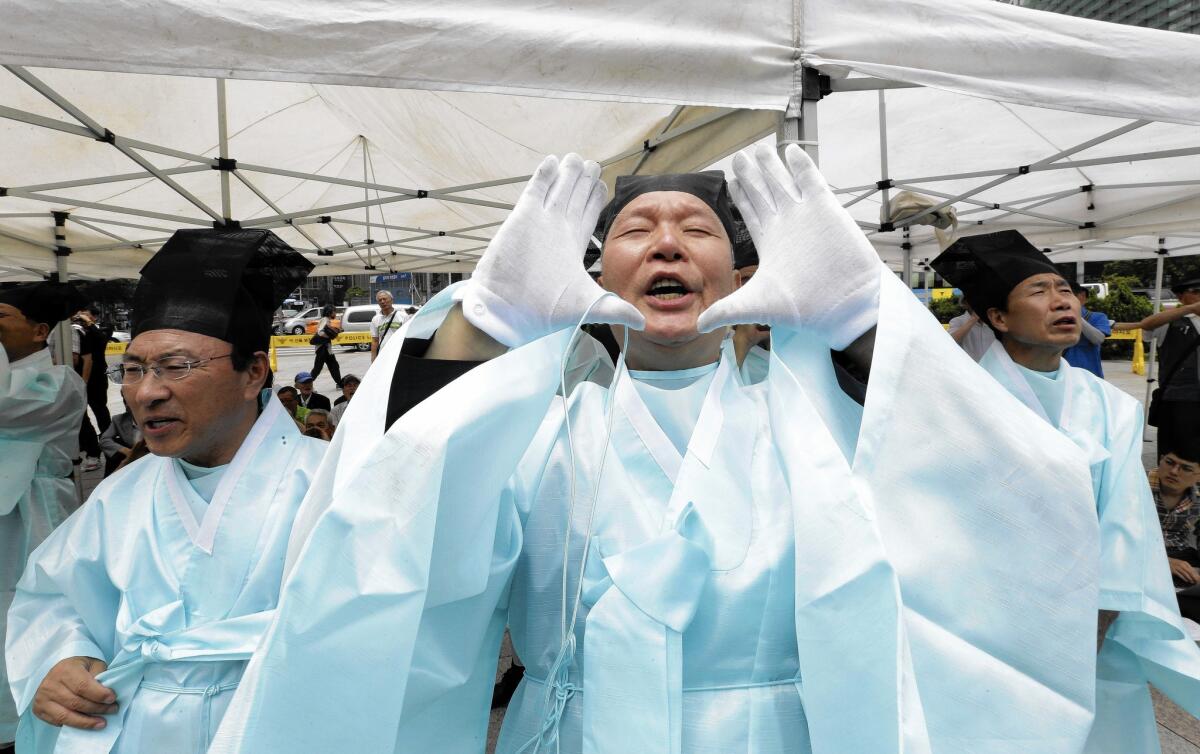S. Korea film offers reminder of 2002 battle with North Korea

Relatives of veterans attend a June 25 memorial service in Seoul marking the 65th anniversary of the start of the Korean War.
- Share via
Reporting from Seoul — Thirteen years ago, a bloody naval battle was raging between North and South Korean forces off the South’s west coast. Six South Koreans and an unknown number of Northerners died in the confrontation, one of the most serious clashes between the nations since their 1950-53 war.
But the events of June 29, 2002, had a short life in the South Korean news cycle. The public was focused on the World Cup, which was then taking place in the country, and earlier that month two South Korean schoolgirls were accidentally run over and killed by a U.S. military vehicle, an incident that generated wide outrage.
But these days, South Korea is in war remembrance mode, with June 25 marking the 65th anniversary of the start of the Korean War. And the 2002 battle is back in the spotlight again, thanks to the release of a new movie, “Northern Limit Line,” which depicts North Koreans in a severe manner.
The historical action film, directed by Kim Hak-soon, shot to the top of the South Korean box office upon its June 24 opening, bumping “Jurassic World” from the top spot. Its portrayal of North Koreans has proved divisive.
A review in the Chosun Ilbo, a conservative newspaper, called the film a fitting tribute to sailors who sacrificed their lives for national security. “The country’s top leadership and the public have ignored this case,” the paper said. “The film remembers those who died protecting the country.”
But others have deplored what they see as a caricatured depiction of North Koreans. “Parts of the scenes felt like a Defense Ministry propaganda film,” said Danny Kim, a graduate student in film studies at Korea University in Seoul.
“It’s a resurfacing of the old ‘North Koreans evil, South Koreans nice’ routine,” added Nemo Kim, a lecturer in film studies at Hankuk University of Foreign Studies in Seoul.
Since their nation became more democratic in the late 1980s, South Korean filmmakers have generally opted to not show North Koreans in such a harsh manner. The 1999 film “Shiri” and “Joint Security Area” the following year were two commercially and critically successful films that brought a more human face to characters from the North.
“Northern Limit Line” takes its name from the disputed Yellow Sea border between South and North Korea where the Battle of Yeonpyeong took place in 2002.
The Yellow Sea has long been a theater for conflict between the two sides. North Korea doesn’t recognize the limit line, which was drawn by the United Nations in 1953 at the end of combat in the Korean War. North Korea claims that its sovereign waters extend far south of the line.
Throughout “Northern Limit Line,” South Korean sailors are shown with humanizing detail, one interacting warmly with his hearing-impaired mother, another with his wife and cherubic baby. The North Koreans are depicted as sullen and evil, one-dimensional characters who rarely speak and never show facial expressions that don’t appear intense or angry.
The core of the film is the June 2002 battle, when a North Korean patrol boat crossed the line and fired on a South Korean vessel. The battle scene is replete with blood and foul language, with the South Korean sailors calling their adversaries “bastards” and other less polite terms.
Uriminzokkiri, a North Korean propaganda website aimed at South Koreans, lambasted the movie as “distorted, fabricated slander.”
After the battle scene, the film is lent emotional weight by documentary footage of the South Korean sailors’ actual funeral. “Northern Limit Line” hits its emotional crescendo when one mother collapses in tears while attempting to place a carnation in front of her son’s portrait on a memorial altar, a standard custom at Southern funerals.
The movie is the latest in a string of nostalgic blockbusters in South Korea, after last year’s “The Admiral: Roaring Currents,” a tale of a 16th century naval battle with Japan, and “Ode to My Father,” a contemporary history, told sympathetically through one family divided by the Korean War.
“Ode” also sparked discussion over how historical events in the film should be remembered, with critics saying that the film showed only the positive aspects of South Korean history.
Kim, the “Northern Limit Line” director, has said that he was motivated by “empathy for the bereaved family” to make the film. He told the Joongang Daily newspaper that he “wasn’t going for a political approach.”
At the time of the 2002 battle, South Korea was hosting the world’s largest soccer tournament; its national team was playing Turkey. The confrontation quickly vanished from headlines and has received little attention in the ensuing years.
This week, Han Min-koo became the first sitting South Korean defense minister to address the navy’s annual Battle of Yeonpyeong commemoration ceremony. “If North Korea launches a reckless provocation again, our military will sternly retaliate,” he vowed to those in attendance, according to the Yonhap News Agency.
“The episode was here today, gone tomorrow,” said Donald Kirk, a veteran Asia journalist and author of “Korea Betrayed,” a biography of Kim Dae-jung, the South Korean president at the time. But the film’s popularity shows the incident has not been forgotten, Kirk said.
“A movie like this reminds people of the whole episode and shows that it has endured in the Korean consciousness.”
Borowiec is a special correspondent.
More to Read
Sign up for Essential California
The most important California stories and recommendations in your inbox every morning.
You may occasionally receive promotional content from the Los Angeles Times.













